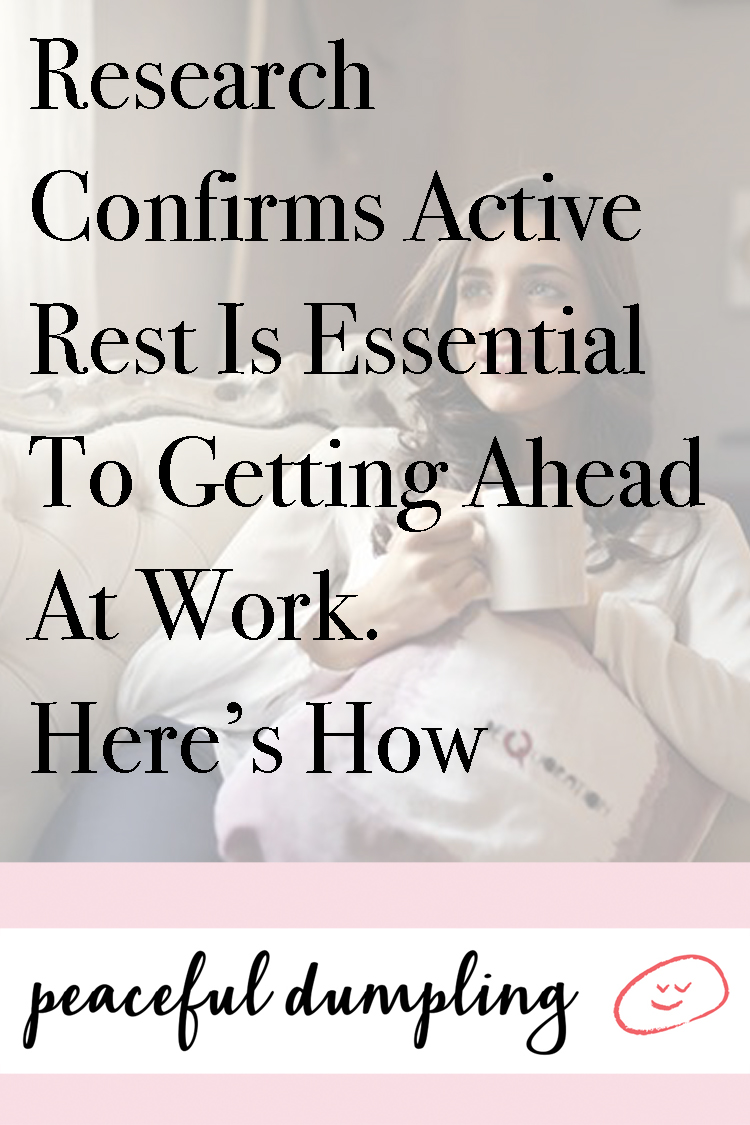Good news for anyone who feels that afternoon slump in the middle of their workday: taking a little time to relax instead of pushing through that sluggish feeling might actually help you be more productive overall.
Recently, researchers have been finding more and more benefits to “active rest.” One of their most surprising findings? Working less might actually help you get more done, and scheduling a little time for rest and relaxation in the middle of your workday isn’t lazy—instead, it can help you work more efficiently and come up with better ideas.
This probably sounds contradictory to everything we usually hear about the importance of working hard and putting in extra hours to succeed. But in our fast-paced society, many of us experience the effects of burnout at some point. Maybe you work long hours each day and often feel exhausted and drained on a daily basis, or maybe you’ve kept up with an extra busy schedule for a month or two, only to find yourself struggling to maintain the pace and desperately needing a break. How do you avoid reaching this point while juggling all of your responsibilities?

The answer lies in working more efficiently, and active rest is key. What is active rest? This term could refer to any activity that helps you relax in a healthy way. For example, scrolling through Twitter and watching Netflix wouldn’t count. But meditation, taking a leisurely walk outside, gentle yoga, or even taking a short nap would all be great examples of active rest.
While working on his book Rest: Why You Get More Done When You Work Less, author Alex Soojung-Kim Pang studied the daily routines of important historical figures to see how they scheduled their days and accomplished so much. His findings proved exactly why we all need a little more active rest throughout our days.
It turns out that plenty of scientists, mathematicians, and creative visionaries were well aware of the importance of active rest in their routines. In fact, some of the most successful people throughout history did not subject themselves to burnout or crazy schedules day in and day out. Surprisingly, some of them worked well under 40 hours per week!
For instance, Charles Darwin, who published The Origin of Species and outlined the theory of evolution, took long nature walks several times a day. He always made time to have dinner with his family, and he split his hours between morning and evening—his entire afternoon was dedicated to some form of active rest. Similarly, the famed mathematician Henri Poincaré published thirty books and about 500 papers while consistently spending only four hours per day on his work in this field.
Through recent studies working with scientists in university settings, researchers have published findings that confirm what people like Darwin and Poincaré knew all along—working longer hours doesn’t necessarily mean you’re getting more done. The scientists working overtime were rarely more productive than their colleagues who worked fewer hours. Other studies have confirmed that productivity often drops after about 90 minutes of concentrated effort and that taking extended breaks every hour and a half can help you avoid brain fog.

Why is active rest so important? During your downtime, your brain is not idle. It’s actually using that time to reflect on recent experiences, process newly acquired knowledge, and synthesize information that could give rise to innovative new ideas. These processes are similar to what happens when you fall asleep.
So, how can you make time for active rest in your typical routine? If you work at an office for your 9-5, it might be a bit more challenging, but when it comes to working from home or simply focusing on your hobbies, there are plenty of methods that will help you work more efficiently in a shorter period of time, allowing you to incorporate active rest into your day.
Plan your to-do list carefully, and see if you can block similar tasks together in 90-minute increments. Multitasking might sound like a great idea in theory, but constantly switching from one unrelated task to another can easily slow you down. Try using a website and app blocker for your computer and phone so that you can concentrate without getting derailed by notifications. And if there are any digital tasks you can automate so that you don’t have to do them personally, it can save you time that could help free up your schedule.
There’s no reason to feel guilty about taking time to yourself throughout the day: in the long run, those periods of active rest will help you get ahead of the game. Active rest is essential for critical thinking, creativity, and improved mental health. Work smart, not hard, and take breaks as needed—you’ll be surprised at how much you get done!

Do you incorporate active rest into your daily routine?
Also by Jane: How You Can Reap The Benefits Of A Keto Diet—Even If You’re Vegan
Related: Working From Home? Here’s Exactly How To Get Noticed & Advance Your Career
Are Smartphones Really Addictive & Depressing? They Don’t Have To Be—Here’s How
Get more like this—sign up for our daily inspirational newsletter for exclusive content!
__
Photo: Pexels




